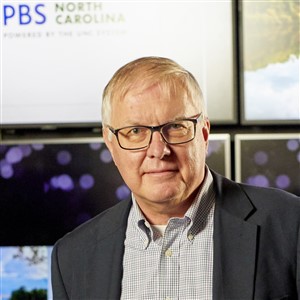PBS North Carolina CTO Fred Engel To Retire
An industry leader, Engel steps down after more than four decades of service in public media

RESEARCH TRIANGLE PARK, N.C.—PBS North Carolina has announced that Fred Engel will retire from his role as chief technology officer on August 31 after an illustrious career spanning 46 years. Chris Pandich, director of engineering services, will serve as interim chief broadcast engineer while a national search for Engel’s successor gets underway.
Engel, who joined PBS North Carolina in 2016, has been hailed as an industry leader for his invaluable contributions to innovative technology projects that serve the public good. In his role, he has developed new applications for PBS North Carolina’s TV broadcast platform to improve public safety communications, remote learning for students not connected to the Internet and security efforts.
“I’ve witnessed firsthand Fred’s deep commitment to the power of public media,” says David Crabtree, CEO and general manager of PBS North Carolina. “Among his many accomplishments, his instrumental role in developing communication devices for first responders stands out. What began as an idea written on a paper napkin has become a reality with the potential to save lives, leaving an indelible mark on our organization and our community. While Fred’s departure marks a loss for our team, we wish him nothing but the best in his future endeavors.”
Fred Engel’s long career has been nothing short of remarkable, PBS North Carolina said.
Over 28 years at PBS member station WTTW in Chicago, he ascended from his position as an engineering maintenance technician to the role of vice president of technology. In 2004, his team garnered an Emmy Award for its work on building a high-definition video master control facility. During his six-year tenure at KET (Kentucky Education Television) as senior director of technology, Engel and his team spearheaded the establishment of streetside studios, the first for public broadcasting, in downtown Louisville.
Since joining PBS North Carolina in 2016, Engel has been a driving force behind the development of innovative applications for the cutting-edge television broadcast technology ATSC 3.0/NEXTGEN TV. His work, which includes the development of a digital paging service that enables more reliable and secure delivery of emergency information to first responders through a non-traditional use of PBS North Carolina’s TV broadcast platform, has garnered widespread recognition.
“I never envisioned what changes would take place when I moved to North Carolina,” says Engel. “Soon after my arrival, PBS North Carolina (then UNC-TV) was approached by public safety communications officials who had heard that ATSC 3.0 technology might be something that could benefit them. Well, the rest is history. Now PBS North Carolina is recognized as a leader in technology innovation, not only in the public broadcasting community but throughout the industry, nationally and internationally.”
The professional video industry's #1 source for news, trends and product and tech information. Sign up below.
As Engel transitions into this new phase of his life, PBS North Carolina reported that he remains committed to staying actively engaged in the industry, continuing to champion the utilization of NEXTGEN TV to enhance community safety and bridge the digital divide.
“I’ve been fortunate to work with passionate, dedicated, smart people who have been driven to serve,” Engel shares. “I’m proud to have been part of that.”
George Winslow is the senior content producer for TV Tech. He has written about the television, media and technology industries for nearly 30 years for such publications as Broadcasting & Cable, Multichannel News and TV Tech. Over the years, he has edited a number of magazines, including Multichannel News International and World Screen, and moderated panels at such major industry events as NAB and MIP TV. He has published two books and dozens of encyclopedia articles on such subjects as the media, New York City history and economics.

